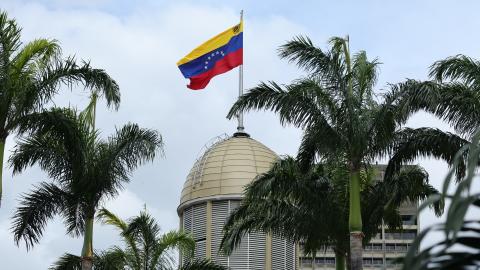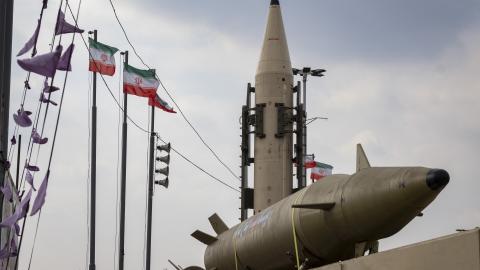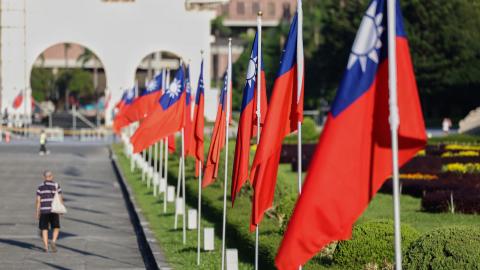Three weeks ago, a former Trump Administration official published a warning to Taiwan. According to Christian Whiton, a senior advisor under former Secretary of State Rex Tillerson, Taipei has “lost” President Donald Trump. Whiton’s screed is full of grievances, accusing Taiwan of “diplomatic slights” and “woke passions.” Beneath it all is Whiton’s frustration, and even offense, at Taiwan’s “inability to understand and relate to the New Right in America.”
It is a bold claim to speak on behalf of any American president, but particularly so with Trump. Tucker Carlson learned this lesson the hard way in June, when he accused the president of abandoning the “America First” movement by bombing Iran’s nuclear facilities. Trump’s response was swift: “I’m the one that decides” what “America First” means. The voters stood with the president. Shortly before the president ordered the strikes on Iran, polling from the Ronald Reagan Institute revealed that 90% of self-identified MAGA Republicans believed that “preventing Iran from obtaining a nuclear weapon is important to U.S. security.” After the strikes, nearly 90% of Republicans expressed confidence in Trump’s handling of Iran.
The episode should have given pause to those in the New Right. Perhaps they were out of step with Trump and the movement he leads. Perhaps their analysis of the international threat climate was flawed (or, as Trump said, “kooky”). Dropping bunker-buster bombs on Fordow and Natanz did not, in fact, lead to World War III. The moment should have compelled those in the New Right to reflect on where they had gone wrong. Whiton, to his credit, recognized this need two months ago, when he criticized “people who want to force the president’s hand and who want to play politics” for “providing poor information.” His broadside against Taiwan, however, suggests that the New Right still has much to learn.
Whiton faults Taiwan’s President William Lai for not calling to congratulate Trump in November 2024, as Tsai Ing-wen did in 2016. “That Trump actually took the call,” Whiton argues, “made news since American leaders seldom talk to their Taiwanese counterparts given the lack of formal diplomatic relations.” Whiton mentions in passing the “controversy” that ensued from this phone call, but it was no passing matter for Taipei. Mainstream media outlets in America criticized Trump in 2016 for breaking with decades of protocol by accepting Taiwan’s call, and called it a gaffe. Chinese officials were also furious and demanded an apology. As Washington Post columnist Josh Rogin put it, the whole episode “ended up poisoning Trump on the issue of Taiwan.” President Lai understandably wanted to avoid another setback — especially since, as Whiton concedes, “Lai was advised by friends with ties to Trump not to attempt the call.” Taiwan can hardly be blamed for erring on the side of caution.
Whiton also attacks Vice President Hsiao Bi-khim as “a woman of the globalist Left.” His evidence? A 2022 Washington Post oped urging democracies “to stand shoulder to shoulder against authoritarian aggression,” specifically in defense of Ukraine. Hsiao’s logic was straightforward: if Ukraine falls to Putin, Xi Jinping will be emboldened to move on Taiwan. She was right to warn that “appeasement is not the path of peace.” Dismissing this common-sense position as “wokeness” says more about the New Right than about Taiwan.
Whiton also criticizes Hsiao for working with groups like the National Endowment for Democracy (NED), the International Republican Institute (IRI). Whiton dismisses them as “globalist organizations,” but never stops to ask how the Chinese Communist Party (CCP) views them. Beijing loathes these organizations — and has sanctioned them both — because they expose the CCP’s lack of political legitimacy. NED and IRI equip dissidents to expose CCP repression. Far from being “globalist,” it’s a competitive strategy that targets Beijing’s greatest weakness.
Why would the New Right pass up an opportunity to hit the CCP where it hurts most? Apparently, because Hsiao wore a face mask to President Biden’s inauguration: “Hsiao…declared on video from the cheap seats at the inauguration that ‘freedom is our common objective.’ She did so speaking through a face mask despite being outdoors — a symbol of the Taiwanese government’s unfortunate pandemic response that kept most Americans from visiting for years.” It seems especially petty in 2025 to keep a list of people’s masking choices at the height of the pandemic — and equally unfair to ignore Taiwan’s largely successful response to the pandemic.
To be sure, no relationship with allies or partners is perfect. Concerns about Taiwan’s low defense spending are longstanding and valid, though even Whiton admits that Taiwan’s divided government introduces real political difficulties. Moreover, Beijing’s campaign to isolate Taiwan politically has constrained the island-nation’s diplomatic options. It has no choice but to maintain friendly relations with Republicans and Democrats alike — as it has done since 1979, when Congress passed the Taiwan Relations Act. Demanding Taipei pick a side in American domestic politics betrays a shocking lack of appreciation of its precarious geopolitical position.
More troubling is the New Right’s broader view of Taiwan. Sohrab Ahmari, a public intellectual, has argued that America’s true threats come from within, and that Taipei has no hope of evading Beijing’s aggression. Darren Beattie, who currently runs public diplomacy at the State Department, is on record saying that Taiwan will “inevitably” belong to China, and that it’s “not worth expending any capital to prevent.” Why should Taiwan take seriously the concerns of a political contingent in America that has already written off its survival? More fundamentally, why should America’s friends and allies consider the views of a political movement so disconnected with the voters they purport to represent? Whiton insists that “most Americans who follow foreign policy see Taiwan as a liability.” Those in the New Right are welcome to their own opinions, but not their own facts. In July, the Vandenberg Coalition published polling from Trump supporters on a range of issues, including Taiwan. A whopping78% of MAGA conservatives agreed that Taiwan is a “vital national security interest” and that America should “prevent China from controlling Taiwan.” Why? Because the American people perceive that Beijing is the problem, not Taiwan. They understand that alienating allies empowers America’s enemies. If the New Right wants to speak for Americans, they should start by listening to them.
Read in Providence.















